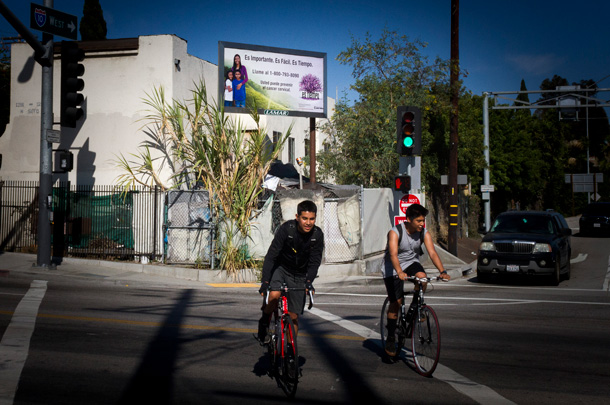“It’s important. It’s easy. It’s time.”
That message in English and Spanish is now adorning bus benches, billboards and lampposts around the Health Sciences as part of a cervical cancer prevention campaign dubbed Es Tiempo.
The message, which also features an image of a jacaranda tree, was spearheaded by Lourdes Baezconde-Garbanati, PhD, MPH, associate professor of preventive medicine at the Keck School of Medicine of USC, to increase awareness among Hispanic women about the importance of routine cervical cancer screenings.
Baezconde-Garbanati said the project was initiated after Laila Muderspach, MD, chair of the Department of Obstetrics and Gynecology at the Keck School, noticed high rates of Hispanic women coming in with advanced cervical cancer, suggesting that many were not getting regular screenings. Cervical cancer remains a leading cause of cancer morbidity and mortality among Hispanic women even though it is largely preventable through screenings and vaccination against human papillomavirus (HPV).
Baezconde-Garbanati took on the campaign as an effort to change those rates, at least in the immediate vicinity of the Health Sciences Campus. The campaign is designed to remind women of the importance of cervical cancer screening and getting their children vaccinated against the human papillomavirus. It’s also easy to do and can save lives when done in time.
In addition to the lamppost banners, signs on bus benches and billboards, workers at Clinicas Monseñor Oscar Romero in Boyle Heights and Pico Union are mailing reminders to schedule an appointment to women who have not had a pap test in three years.
Jazmin Gutierrez, a patient at Clinicas Monseñor Oscar Romero, said the campaign opened her eyes about the danger of not getting screened for cervical cancer. She made an appointment for herself and plans to promote cervical cancer screening and HPV vaccination among her friends and family members.
Baezconde-Garbanati said she is heartened by the fact that women have started to respond to the campaign.
“I believe that people are craving information and we are beginning to see people respond,” she said. “With this campaign, I feel like we are going to make a difference and save lives in our community.”
The Norris Whittier Foundation, California Community Foundation and the USC Center for Health Equity in the Americas provided funding for the Es Tiempo campaign.
— Hope Hamashige


